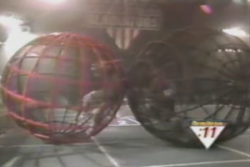Micro-expression Behavior Scanners:
Voice Analyzers:
A new walk-through airport lie detector made in Israel may prove to be the toughest challenge yet for potential hijackers or drug smugglers.
Tested in Russia, the two-stage GK-1 voice analyzer requires that passengers don headphones at a console and answer “yes” or “no” into a microphone to questions about whether they are planning something illicit.
The software will almost always pick up uncontrollable tremors in the voice that give away liars or those with something to hide, say its designers at Israeli firm Nemesysco.
“In our trial, 500 passengers went through the test, and then each was subjected to full traditional searches,” said Chief Executive Officer Amir Liberman. “The one person found to be planning something illegal was the one who failed our test.”
The GK-1 is expected to cost between $10,000-$30,000 when marketed. A spokesman for Moscow’s Domodyedevo airport, which is using a prototype, said “the tester (lie detector) has proved to be effective and we are in principle ready to use it.”
The September 11, 2001 hijacking attacks have led to a slew of innovations designed to boost airline security. Liberman said several countries had expressed interest in the GK-1.
“Unlike conventional lie detectors such as the polygraph, this is minimally invasive, requiring hardly any physical contact,” Liberman said, adding that the first stage of the test takes between 30-75 seconds.
Those that fail are taken aside for more intensive questioning and, if necessary, searches. Liberman said around 12 percent of passengers tend to show stress even when they have nothing to hide.
“Some may feel nervous because they have used drugs, while having no intention to smuggle drugs,” he said. “The whole thing is performed in a low-key manner to avoid causing anxiety.”
Flash overview of the system here:
http://www.security-access-control.com/
It turns out that this was first mentioned awhile ago:
http://www.freerepublic.com/focus/f-news/1067973/posts
A new Israeli invention called “Voice Analysis Eyeglasses” has created a new brand of lie detectors that make the need for wires and electrodes absolute. In fact, the new lie detector developed in Israel is so inconspicuous that one may not even know they are being monitored.
The glasses provide lie detection analysis on the inside of their lenses about whoever is speaking at the time, claims Nemesysco, the Israeli company which developed the new technology. Mathematician Amir Lieberman at Nemesysco’s headquarters in the town of Zuran, developed the glasses for military, insurance claim, and law enforcement use. The technology is also being repackaged and retargeted for personal and corporate applications by V Entertainment in New York.
The heart of Nemesysco’s security-oriented technology is a signal-processing engine that is said to use more than 8,000 algorithms each time it analyzes an incoming voice waveform. In this way it detects levels of various emotional states from the pitch and speed of the voice simultaneously.
Anti-terrorism, law enforcement, insurance and workers compensation claim assessment companies are already beginning to use variations of the eyeglass technology software which is already available as a downloadable PC program which can analyze voices either live or over the phone.
“We’re actually developing two types of glasses – one for security use and one for commercial use,” Lieberman told Israel21c. “A chip inside the glasses is able to read the voice frequency of the person you are talking to. The voice is analyzed through that chip for nine different types of voice analysis and there are lights that indicate whether the person is lying.”
Lieberman says the glasses will be available in the U.S. by June for a price ranging between $500 and $1000.
Early this month (January), V Entertainment displayed sunglasses outfitted with the technology at the 2004 International CES in Las Vegas. The system used green, yellow and red color codes to indicate a “true,” “maybe” or “false” response. “We’re in the process of deciding whether to offer just one type of glasses – which is limiting fashion-wise or to develop a kit that will connect to almost any glasses,” Lieberman said.
But for the security establishment, more important than the fashion aspect is how Lieberman’s breakthrough technology can change security checkpoints. V’s Gatekeeper Security product, GK-1, uses LVA technology to provide an easy-to-use way of clearing people through security checkpoints in less than 30 seconds. Gatekeeper uses the responses to five ‘yes or no’ pre-scripted questions to provide real-time analysis and signal ‘Green’ for cleared, or ‘Red’ for the need for further questioning.
The LVA technology measures voice for a variety of parameters including deception, excitement, stress, mental effort, concentration, hesitation, anger, love and lust. It works prerecorded, over the phone and live, the company said. V Entertainment recommends it for screening phone calls, checking the truthfulness of people with whom you deal or gauging romantic interest.
“Truth has a certain parameter, and we are 98 percent accurate in identifying it,” Richard Parton, V’s CEO told Newsweek. Unlike earlier voice-stress-analysis programs, which simply monitored voice frequencies, the company’s “layered voice analysis” software analyzes 129 aspects of sound.
The law enforcement version achieved about 70 percent accuracy in laboratory trials, according to V Entertainment, and better than 90 percent accuracy against real criminal subjects at a beta test site at the U.S. Air Force’s Rome Laboratories.
“It works off the frequency range of voice patterns,” Parton told the EE Times. This is very different from the more common polygraph, which measures changes in the body, such as heart rate. With Nemesysco’s technology, a questioner can measure “thinking level” – how much thought was put into giving an answer – often an indicator of falsehood.
The software measures emotional stress and an “SOS level,” which tells how badly someone doesn’t want to talk about something. Nemesysco’s patented Poly-Layered Voice Analysis (LVA) measures 18 parameters of speech in real-time for interrogators at police, military and secret-services agencies. According to Nemesysco, its accuracy as a lie detector has proven to be less important than its ability to more quickly pinpoint for interrogators where there are problems in a subject’s story. Officers can then zero in much more quickly with their traditional interrogation techniques.
The technology is already in use by some American law enforcement agencies. A British financial firm, HBOS (Halifax and Bank of Scotland), is testing to see if the LVA technology will weed out clients who make fraudulent insurance claims.
![Transhumanism v1.0: Teenage Social Popularity Anxiety Obsessionism Immortalized [written by] (2013)](https://ignoranceisfutile.files.wordpress.com/2013/06/knife.jpg)
![Elect All Serial Killers [written by] (2013)](https://ignoranceisfutile.files.wordpress.com/2013/06/elect.jpg)








Glad that they invented such software like this, it just like a liar detector test kit.
I am astonished that you would give coverage to Nemesysco’s bogus systems. From a technological point of view they are worthless (except, of course, to the CEO Amir Liberman, who no doubt is raking in the dough when he charges $10k to $30K for each one). What proper scientific tests have been done on them show that they work as well as a coin flip: heads the speaker’s not lying (or manifesting stress); tails, they are. His systems have no scientific basis; they are amateurish contraptions. The scientific tests cited by the company on their website have all been conducted by people with a financial interest in the sale of the systems. No peer-reviewed studies have been published supporting the efficacy of any of Nemesysco’s products.
Check out these websites: (and follow the links cited):
https://antipolygraph.org/blog/?p=245
What a material of un-ambiguity and preserveness of
valuable familiarity concerning unpredicted emotions.